Wise wordspublished at 08:58 BST 22 June 2018
Our proverb of the day:
Quote MessageAn old rabbit suckles its young."
A Rwandan proverb sent by Delphine Umutoni in Toronto, Canada
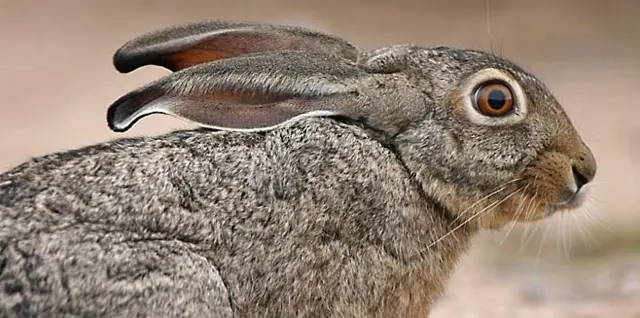 Image source, .
Image source, .S Sudan's Riek Machar to be relocated after peace talks
No US visas for 'corrupt' DR Congo officials
Ethiopia's outlawed Ginbot7 'halts armed resistance'
Cameroon PM says internet used to 'spread hate and terror'
EU is considering placing migrant centres in Africa
Nigerian 'sex-for-marks' professor dismissed
Three Gambians fatally shot during environmental protest
Algeria restrict internet access to stop students cheating
Natasha Booty
Our proverb of the day:
Quote MessageAn old rabbit suckles its young."
A Rwandan proverb sent by Delphine Umutoni in Toronto, Canada
 Image source, .
Image source, .Welcome back to BBC Africa Live, where we will bring you the latest news and views from around the continent.
We'll be back tomorrow
BBC Africa Live
Flora Drury
That's all from the BBC Africa Live page today. Keep up-to-date with what's happening across the continent by listening to the Africa Today podcast or checking the BBC News website.
A reminder of today's wise words:
Quote MessageWhere a woman rules, streams run uphill."
An Ethiopian proverb sent by Zainab-Binta Kamara, London, UK, and Kristiana St. Vincent, Charlottesville, Virginia, US
Click here to send in your African proverb
And we leave you with this picture from Malawi, where people were marking World Refugee Day on Wednesday:
Allow Instagram content?
This article contains content provided by Instagram. We ask for your permission before anything is loaded, as they may be using cookies and other technologies. You may want to read Meta’s Instagram cookie policy, external and privacy policy, external before accepting. To view this content choose ‘accept and continue’.
Many African farming systems are controlled by men.
But there are moves afoot to revolutionise the sector in favour of small farms run by women.
Dr Agnes Kalibata, Rwanda's former agriculture minister and the president of the Alliance for a Green Revolution in Africa, has been speaking to the BBC's Hassan Arouni about the challenges they face in a male-dominated industry:
Dr. Agnes Kalibata on how to revolutionise women small-holder farmers
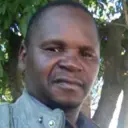 Jose Tembe
Jose Tembe
BBC Africa, Maputo
Three children have been kidnapped from separate locations in a Mozambican district.
The children, who range in age form three to 14, were taken in dawn raids on Wednesday from the Gorongosa district of the central Mozambican province of Sofala.
Their kidnappers were armed with blunt instruments like machetes.
Bruno Begos, a senior member of the Gorongosa district police command, said police were working hard to find the children.
He added:
Quote MessageWe received information according to which three kids had disappeared. We are currently taking measures first to locate the children to bring them back to their respective families. It’s still premature to give details.”
Fiona Equere
BBC Pidgin
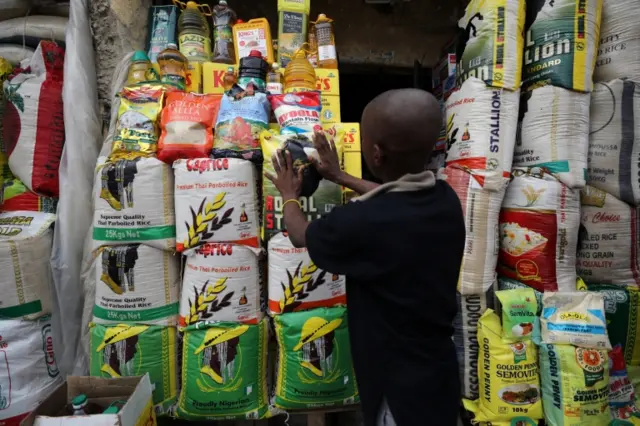 Image source, Reuters
Image source, ReutersIf Nigeria shuts its border, rice smuggling will increase, local dealers have told the BBC.
Their warning comes after agriculture minister Audu Ogbeh threatened to close the border with an unnamed neighbouring state which he accused of illegally importing the staple to Nigeria.
Rice dealers say local produce is more expensive, less popular and less clean than the imported rice, with Oluwanishola Obisesan telling the BBC she feels the whole move will just help a few people make more money.
“I bought rice from Nassarawa. It was sandy, dirty and filled with shaft. People didn’t buy it,” she said.
"This move by government will give the smugglers more money because in Nigeria, people know how to cut corners and find a way around things."
President Muhammadu Buhari’s administration has made efforts to help rice farmers and local production has increased.
Even so, Obisesan says she doesn’t feel the local rice production will meet the demand in the market.
However, Joseph Attah, Nigeria Customs Service press officer, said "the behaviour of the authorities from neighbouring countries is affecting our national food security and it’s a serious threat to our country".
"And it can lead to a decision to close our border. What I mean is the smuggling of rice and cars inside the country," he said.
 Milton Nkosi
Milton Nkosi
BBC Africa, Johannesburg
Quote MessageUnder the NHI [National Health Insurance] the rich will subsidise the poor, the young will subsidise the old, the healthy will subsidise the sick, the urban will subsidise the rural.”
This is how South Africa’s health minister Aaron Motsoaledi explained what will happen once his bill becomes law.
“South Africa is an outlier," he said. "We have privatised healthcare even more than the US. And yet we fight if any other service is about to be privatised.”
The bill, which was gazetted on Thursday, proposes the establishment of a NHI Fund which will buy services from both public and private medical providers.
Dr Motsoaledi said he consulted with former CEOs of the UK’s National Health Service (NHS), which was established in 1948, before he unveiled the bill.
But not everyone in the country is in favour of the scheme.
Katleho Mothudi, from the Board of Healthcare Funders, the body representing more than 70% of medical insurance companies, says “it is still not clear where the money will come from”.
He also raised concerns about levels of quality dropping.
Interested parties have three months to comment. The scheme will be fully implemented by 2026, the minister said.
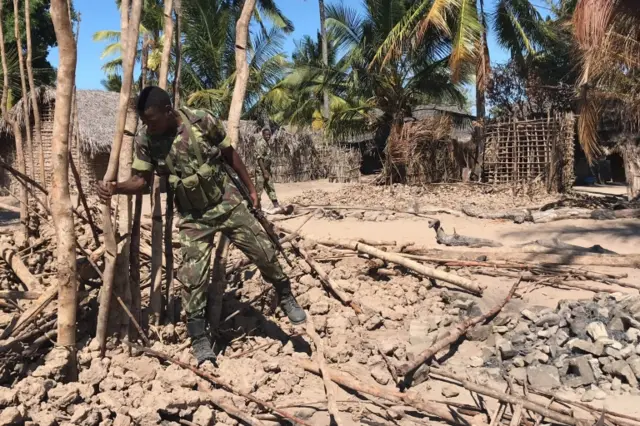 Image source, AFP
Image source, AFPA soldier helps bring down a home torched by suspected militants earlier this month
Suspected members of an Islamist militant group terrorising northern Mozambique have struck another village, killing five people - including a child.
The raiders also burned down 44 homes in Lipandacua, Macomia district, Cabo Delgado province, the publicly-owned broadcaster, Radio Mozambique, said.
The youngest victim was sleeping in one of the houses when it was set alight.
Cabo Delgado police commander Joaquim Sive told Radio Mozambique a unit from the security forces had gone to the village to assess the situation.
This follows lethal attacks on the villages of Naene, also in Macomia, earlier this month, and of Namaluco, in the neighbouring district of Quissanga, two days later, in which a total of 14 people were murdered and 400 houses were destroyed.
The attacks in Cabo Delgado have led to calls for greater vigilance in the neighbouring province of Niassa.
Thus Angelina Nguirezi, administrator of the Niassa district of Marrupa, has called on young people not to be deceived when people of doubtful origin and behaviour offer them jobs.
More than 40 villagers have been killed in Cabo Delgado since the attacks by Islamist militants, known locally as al-Shabab, began in October last year.
Celestine Karoney
BBC Sport Africa
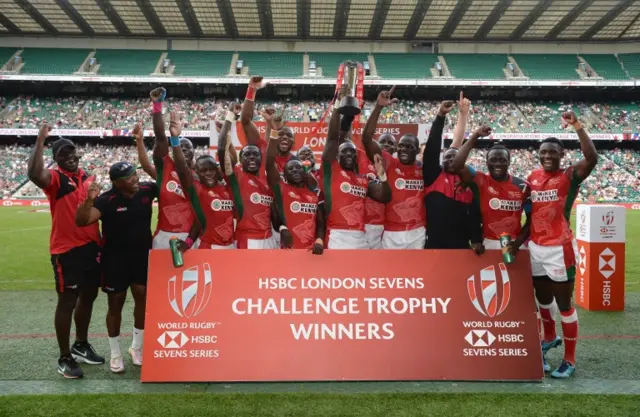 Image source, Getty Images
Image source, Getty ImagesThey’re a favourite with the fans, but Kenya’s participation in next month’s Rugby Sevens World Cup in San Francisco is under threat.
This comes after the country’s Ministry of Tourism cancelled its $200,000 (£150,000) sponsorship of the team, blaming the decision on the non-payment of players.
The ministry says the Kenya Rugby Union has breached their partnership by not paying players an agreed upon allowance.
Their decision led to an on-field protest which saw players cover up the sponsor’s "Make It Kenya" catch phrase on their game jerseys during a recent tournament in France.
In retaliation, the ministry says it will cut all its funding to the Kenya Rugby Union as the team had “embarrassed the country”.
The union, which had previously expressed dismay at a lack of funds needed to take the team to the World Cup, says the sponsorship money was received late and they communicated the delay to the players.
 BBC World Service
BBC World Service
Weddings are a big deal in Uganda - and for many people, it is a no-expense-spared event.
But obviously, that comes at a cost.
So, what do you get for your money - and what happens once the honeymoon is over?
Watch the video below to find out:
Wedding planner Rita gives her tips for a dream wedding but warns about the costs
Cristiano Ronaldo may not be in Moroccans' good books right now, having ended the country's World Cup dreams yesterday, but he does have the respect of one of Africa's greatest-ever players.
Former Ivory Coast striker Didier Drogba has told BBC the Portuguese player's "evolution is very impressive".
Hear what he has to say below:
Former Ivory Coast striker Didier Drogba heaps praise on Portugal star Cristiano Ronaldo
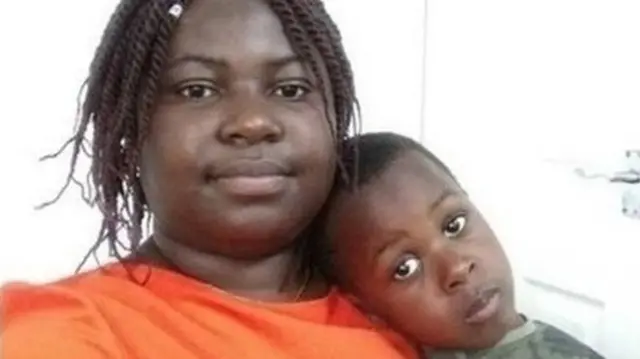 Image source, Anthony Nolan Trust/Shirley Kordie
Image source, Anthony Nolan Trust/Shirley KordieShirley Kordie and her son Belssing, four
A Ghanaian man has been denied a UK visa which he needed so he could save his sister's life.
Joseph is a "perfect" stem cell match for Shirley Kordie, who lives in Walsall, England.
She is in desperate need of a transplant due to a rare blood condition, hypoplastic MDS, and will leave her son, Blessing, four, without a mother if she is not treated.
But his visa application was denied due to his "financial circumstances".
The Home Office has been asked to comment.
Read the whole story on the BBC website by clicking here.
South Sudan’s rivals may have met face-to-face - and even hugged – in the latest bid to end the country’s civil war, but ,as a Kenyan cartoonist shows, it only comes at the insistence of regional powers.
In his cartoon, Victor Ndula urges Ethiopia’s new Prime Minister Abiy Ahmed to keep prodding President Salva Kiir and exiled rebel leader Riek Machar to keep talking at their meeting in Addis Ababa:
Allow X content?
This article contains content provided by X. We ask for your permission before anything is loaded, as they may be using cookies and other technologies. You may want to read X’s cookie policy, external and privacy policy, external before accepting. To view this content choose ‘accept and continue’.
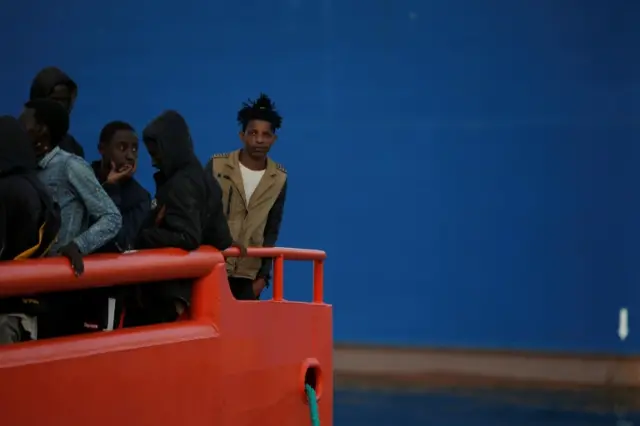 Image source, Reuters
Image source, ReutersMigrants stand on a rescue boat in the Mediterranean
The European Union (EU) has said it will not create a "Guantanamo Bay for migrants" as it pushes ahead with plans for centres in north Africa.
Dimitris Avramopoulos, the EU's commisioner for migrants, said the group was talking to various United Nations agencies about the proposals.
He said they were now looking at ways to "further engage northern African countries in discussions on possibilities for regional disembarkation schemes".
However, he stressed these centres would not end up like the notorious detention centre set up by the US in Cuba, which has been accused of numerous human rights' abuses.
He told reporters:
Quote MessageI want to be very clear on that. I'm against a Guantanamo Bay for migrants. This is something that is against our European values."
He added:
Quote MessageThe way I see this is as an agreement of countries around the Mediterranean to ensure the people get the protection they need and are treated with the dignity they deserve. But it must also mean that getting on the boat does not mean a free ride to the European Union."
EU leaders will discuss the plans at a June 28-29 summit.
 Enoh N'Dri
Enoh N'Dri
BBC Africa, Dakar, Senegal
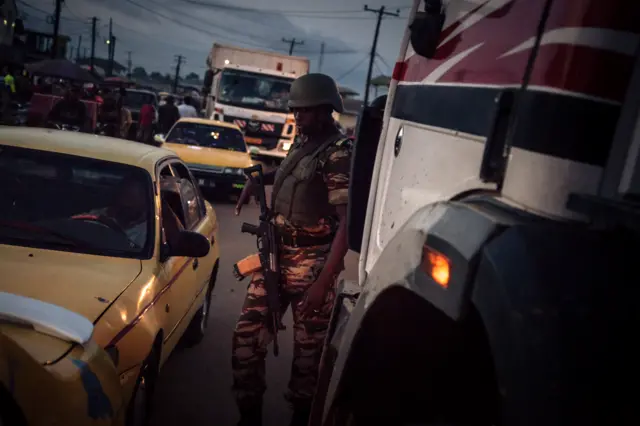 Image source, AFP
Image source, AFPViolence between the government and Anglophone separatists escalated after protests in 2016
Cameroon's prime minister has blamed "the diaspora... crouched in the shadows" for the violence which has engulfed parts of the country.
Philémon Yang accused Cameroonians living overseas of using social media to "spread hate speech and terror" and to even "order murders".
He said:
Quote MessageSocial media have become the favourite ground for the sponsors of terrorism orchestrated by Cameroonians in the diaspora. Crouched in the shadows and hidden behind the keyboards of their computer and smartphones, these Cameroonians of the diaspora spread hate speech and terror and do not hesitate to order murders."
Mr Yang also said more than 80 members of the security forces have been killed during months of fighting with Anglophone separatists in the country's South-West and North-West regions.
Another 100-or-so civilians and state representatives have also been killed or kidnapped, he added.
Mr Yang went on to announce a new $220m (£167m) emergency humanitarian assistance plan for hundreds of thousands of civilians that the government says have been displaced by the fighting.
The violence escalated in late 2016, following a series of protests from Anglophone Cameroonians, who say they are discriminated against by the country's Francophone authorities.
Amnesty International says the government has responded with "arbitrary arrests, torture, unlawful killings and destruction of property".
Almost two in three people living in the world's youngest country are in desperate need of food aid following five years of war.
But hopes of a peace deal have risen in recent days after the leaders of South Sudan's two warring sides met in Ethiopia.
The BBC has gained rare access to report from the country, the most dangerous place in the world to be an aid worker, which you can watch below:
Inside South Sudan's civil war
Two female suicide bombers left 15 people injured in north-eastern Nigeria, news agency AFP reports.
Borno state police spokesman Edet Okon told the agency the first woman exploded when she was shot by officers near a military base in Maiduguri on Wednesday evening.
The second woman died after detonating her device near a rickshaw, he added.
Mohammed Selman
BBC Amharic
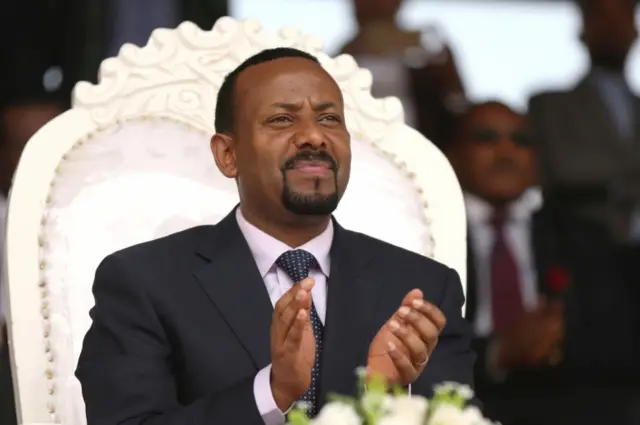 Image source, Reuters
Image source, ReutersAbiy Ahmed
The exiled Ethiopian opposition group, Ginbot 7, has declared its support for the reconciliation call by Prime Minister Abiy Ahmed.
The Eritrea-based rebel group’s statement came shortly after Eritrean President Isaias Afeworki announced his intention to seek peace with Ethiopia on Wednesday.
The two countries have been in a “no peace, no war” stand off for the past 17 years, following a bloody and inconclusive border war between them.
Talking to BBC Amharic, a spokesman for the group Tadesse Biru said: ‘‘Armed struggle wasn’t in our best interest from the beginning; rather the un-enabling political environment in Ethiopia forced us to pursue insurgence.
‘‘Ginbot 7 never fired a bullet and any that were fired were intended to defend ourselves, not to overthrow the government and take power.’’
The new Ethiopian Prime Minister Abiy, who took office in April, has promised to scrap the strategy the government has previously pursued against opposition forces.
As a result, Mr Tadesse says Ginbot 7 will "return home if Abiy’s government continues its path of eliminating repressive laws and building democratic institutions".
 Louise Dewast
Louise Dewast
Kinshasa, DR Congo
Getting around Kinshasa, the capital of the Democratic Republic of Congo, can be headache.
Many of the city's 10 million residents use minibuses, which are often very old and too packed.
Now, for those who can pay a little extra, hundreds of yellow taxis are available in most parts of the capital.
Following a number of cases of people getting robbed and kidnapped for ransom while using informal taxis, known by locals as "ketch", provincial authorities made it a requirement for taxis to paint their cars in yellow with a visible identification number.
"It's a very good decision, and clients appreciate it," taxi-driver Junior told the BBC.
"Yes, it's a good thing, the number of crimes has gone down," said client, Davina, aboard a yellow taxi.
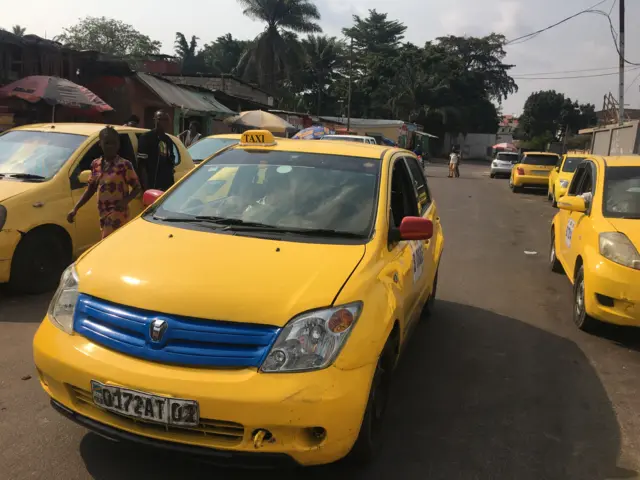
Drivers say they had to pay between $80 (£60) and $180 to repaint their cars, and around $15 to get an identification number, which can take up to several weeks.
Not everyone agrees the new measures will prevent kidnappings.
"They've imposed this on us to reduce crime, but the problem is that those criminals just painted their cars yellow.
"It's good for us, because now if your car isn't yellow you'll have difficulty getting clients, but it doesn't improve security," said taxi driver, Djerba.
Clients also have mixed feelings about the new measures.
"Yellow, red, green, a colour doesn't mean security. I think it hasn't really changed anything, they should focus on security instead," said Bijou, who frequently takes taxis.
After announcing the new rules, dozens of checkpoints were set up to conduct controls and give out fines, causing traffic along the main roads.
"They are penalising us clients, they should change their ways of doing things," added Bijou, as another client interjected: "We need to break eggs in order to make an omelette!"
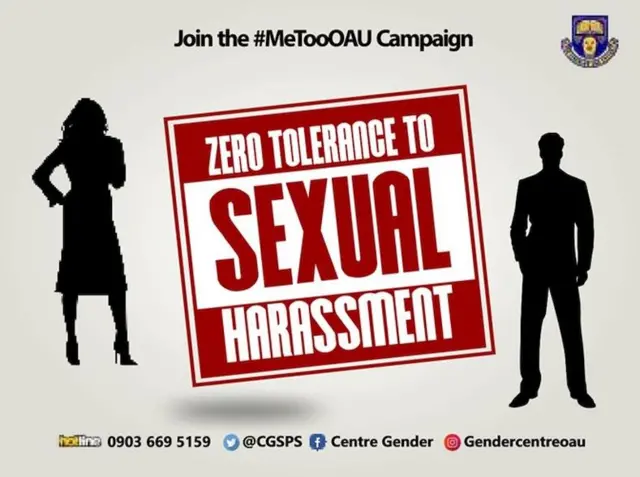 Image source, OAU
Image source, OAUA Nigerian professor who allegedly offered to change a student's marks in return for sexual favours has been dismissed from his position.
Richard Akindele was fired from his job as an accounting lecturer at Obafemi Awolowo University (OAU) in south-western Nigeria after Monica Osagie decided to publish a conversation in which he said he would increase her grades if she slept with him.
The recording went viral, prompting comments in parliament and across social media.
The "scandalous" behaviour had, OAU Vice-Chancellor Eyitope Ogunbodede said in a statement, "brought ridicule to the name of the university" and "tarnished" its reputation.
According to Professor Ogunbodede, Professor Akindele said Miss Osagie knew she had passed but "was seeking to score an A" and was actually sexually harassing him.
However, the vice-chancellor said this version of events "cannot be supported by any evidence".
Professor Akindele has not yet commented on the findings.
Biola Akiyode, who is representing Miss Osagie, told CNN she was , external"very happy" with the outcome of the hearing.
"This is a huge victory, not just for Monica but for other students," Ms Akiyode said.
"This victory should encourage any student, no matter if they are university or secondary school students to speak out.
"What Monica did was very brave and I hope lecturers will now see that there are consequences to their actions."
The university has since launched a campaign against sexual harassment.